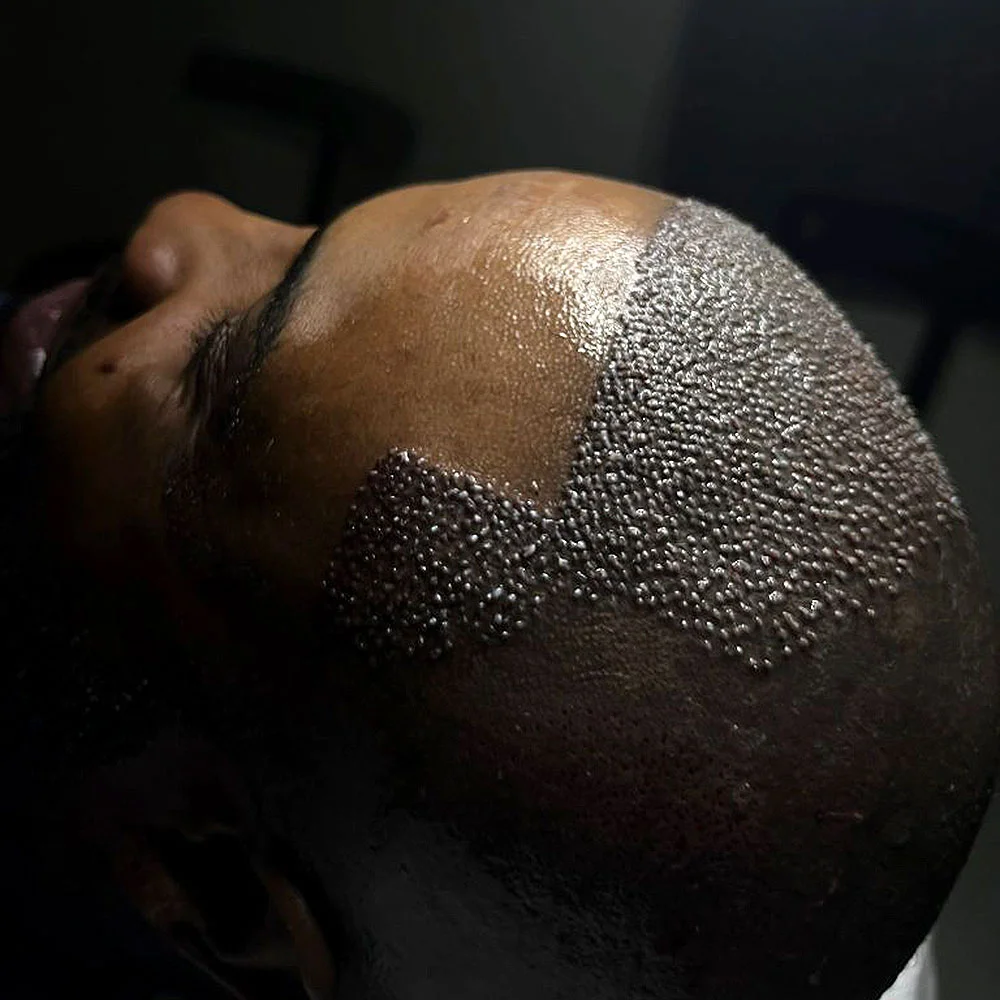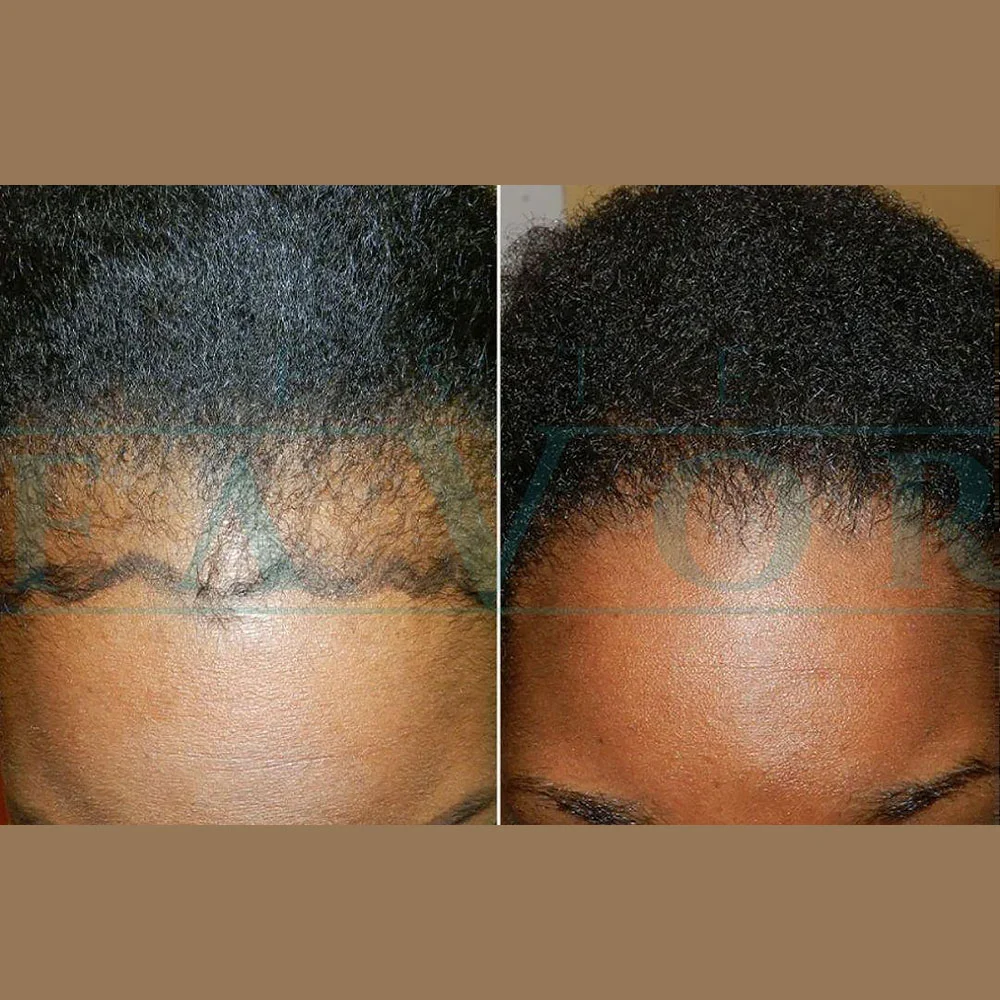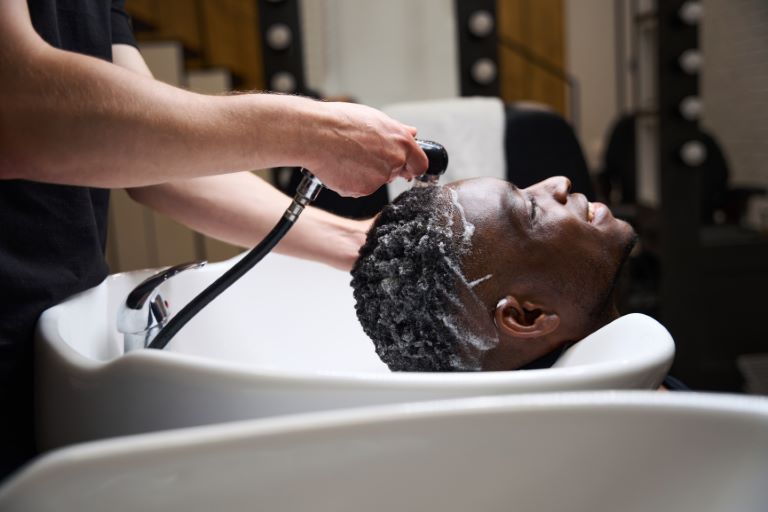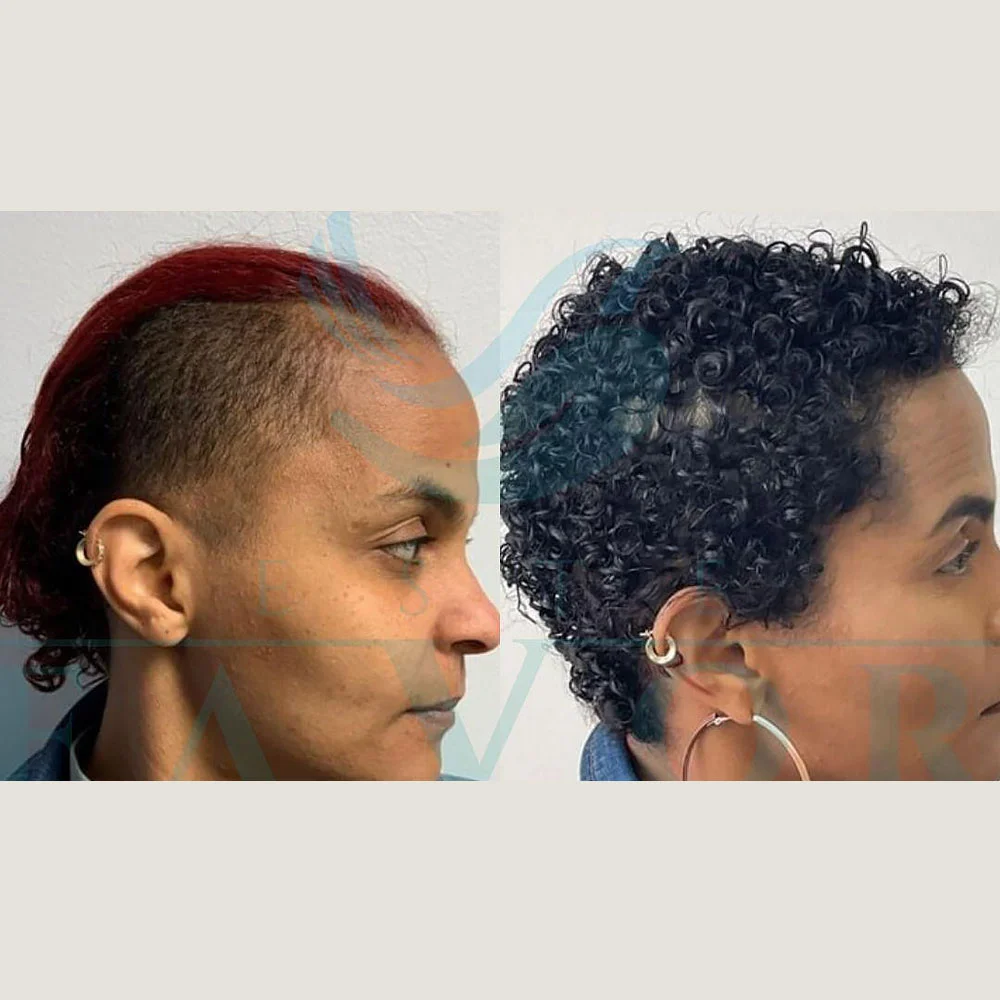Afro hair types are beautifully diverse, rich in texture, and deeply rooted in cultural identity. Within this spectrum, 4A, 4B, and 4C hair types are often misunderstood or grouped together, yet each has its own unique characteristics, care needs, and styling potential. Understanding your natural afro hair texture is the foundation for achieving healthy, strong, and vibrant curls or coils.
Table Of Contents - Sayfa İçeriği
ToggleWhether you have 4A defined curls, 4B zigzag strands, or 4C tight coils, recognizing your specific type allows you to choose the right afro hair care routine, products, and protective styles that nourish your natural pattern instead of working against it.
What Is Type 4 Hair?
Type 4 hair, one of the most recognized afro hair types, is known for its tight curls, coils, and zigzag patterns. Because of its unique structure, it’s often the most fragile and dry hair type — natural oils struggle to travel from root to tip, making moisture retention a key challenge. Type 4 hair also experiences significant shrinkage, which means it often looks much shorter than its true length.
Within type 4 afro hair, there are three distinctive subcategories:
- 4A: Defined, springy coils with visible curl patterns.
- 4B: Less defined strands forming a sharp, zigzag shape.
- 4C: The tightest coils, with little to no visible definition unless styled.
Each texture under the afro hair types umbrella requires a tailored care approach focused on hydration, gentle detangling, and protection. Let’s break them down one by one.

Type 4A Hair: Defined, Moisture-Loving Coils
Among the various afro hair types, type 4A hair stands out for its soft, springy, and well-defined curls. It’s characterized by fine to medium strands that form a visible S-shaped curl pattern. This texture tends to be highly versatile yet delicate — it requires consistent moisture to maintain its elasticity and natural shine. With around 50% shrinkage, 4A hair often appears shorter than it truly is, even though it’s rich in volume and movement.
Unlike other type 4 hair textures, 4A curls hold definition more easily when properly hydrated. These coils respond best to moisture-based styling routines that enhance curl shape without stiffness. Hydration is the foundation — once achieved, it brings out the hair’s natural bounce and luster. Using lightweight leave-ins, curl creams, and natural oils helps retain that healthy, defined look.
Care Tips for Type 4A Hair:
- 4A hair thrives with moisture-rich products. Look for leave-ins, curl creams, and deep conditioners formulated for afro-textured hair.
- Use the LOC or LCO method (Liquid, Oil, Cream) to seal in hydration effectively.
- Always detangle gently with a wide-tooth comb or your fingers on damp hair.
- Incorporate protective styles such as twists, braids, or bantu knots to retain length and prevent breakage.
Styling Tip:
Embrace styles that showcase your curl definition — twist-outs, braid-outs, and wash-and-go looks work beautifully on type 4A hair. Avoid heavy gels or waxes that can weigh the curls down or reduce volume. Instead, opt for light hold styling creams that encourage natural movement and softness.
Type 4B Hair: Bold, Voluminous, and Beautifully Textured
Among all afro hair types, type 4B hair stands out for its fluffy, cotton-like texture and bold volume. Its strands bend in sharp Z-shaped angles rather than forming a defined curl, creating a dense and full-bodied appearance. While this texture exudes strength and presence, it’s also delicate and prone to dryness, requiring consistent care and deep hydration to maintain flexibility and softness.
Unlike 4A’s springy coils, type 4B hair often appears less defined and more compact due to up to 70% shrinkage. But this density gives it incredible versatility — it holds styles beautifully and can create striking silhouettes, from twist-outs to stretched looks. Because it’s more porous, 4B hair craves moisture-rich formulas that keep the strands supple and strong.
Care Tips for Type 4B Hair:
- 4B hair needs intense hydration and flexibility — opt for thicker creams, butters, and oils formulated for natural afro hair.
- Moisturize consistently, even daily, depending on your hair’s porosity level and climate.
- Use your fingers or a wide-tooth comb during conditioning to gently detangle and prevent breakage.
- Avoid tight braids or ponytails that pull at the roots, as these can contribute to traction alopecia over time.
Styling Tip:
To elongate your coils without heat, use stretching techniques like banding, African threading, or braid-outs. These methods help showcase your natural length while protecting your strands from heat damage and tension. Embrace your hair’s cloud-like fullness — it’s one of the most expressive textures within the afro hair types family.
Type 4C Hair: The Crown of Coils and Ultimate Definition Power
Among all afro hair types, type 4C hair is the most tightly coiled, beautifully dense, and uniquely textured. Its strands form microscopic curls that create a soft, voluminous shape with minimal visible definition. This hair type is also the most delicate — each curl bend is a potential breaking point — which means moisture, patience, and protection are essential for keeping it strong and healthy. With up to 75% shrinkage, 4C hair often appears shorter than it truly is, yet it holds incredible length and resilience when properly cared for.
The beauty of 4C natural hair lies in its versatility and expressive nature. When hydrated and styled with intention, it transforms effortlessly — from cloud-like afros to ultra-defined twist-outs or sculpted updos. Because 4C strands are densely packed, they require consistent moisture layering to stay supple and prevent tangling. Deep conditioning and protective styling are key pillars of any afro hair care routine tailored for this texture.
Care Tips for Type 4C Hair:
- 4C hair needs deep, consistent moisture. Hydrate with water-based products, then seal with oils or rich creams to lock it in.
- Regular deep conditioning treatments are essential for maintaining elasticity and preventing dryness.
- Always detangle with fingers or a wide-tooth comb while hair is saturated with conditioner to reduce breakage.
- Protect your strands at night — use silk or satin scarves, bonnets, or pillowcases to minimize friction and moisture loss.
Styling Tip:
4C hair can rock any look — from bold afros to defined twist-outs and braided styles. The key is patience: allow your coils time to set and form. When cared for properly, this hair type showcases unmatched beauty, strength, and authenticity — a true testament to the diversity within afro hair types.
Common Challenges for Type 4 Hair — and How to Overcome Them
Every texture within the afro hair types family comes with its own beauty and set of challenges. For type 4 hair, its tight coils and fragile structure make it especially prone to dryness, tangles, and breakage. Understanding these challenges is the first step toward developing a healthy, effective natural hair care routine that strengthens your strands and enhances their natural texture.
Common Issues Faced by Type 4 Hair:
- Dryness: The tight curl pattern makes it difficult for natural oils (sebum) to travel from root to tip, often leaving the ends dry. Hydration and sealing with oils or creams are essential.
- Breakage: Because type 4 hair strands are naturally delicate, rough handling, frequent heat use, or lack of moisture can lead to easy snapping. Gentle detangling and protective styling are key.
- Shrinkage: While some see shrinkage as a setback, it’s actually a sign of healthy elasticity — proof that your hair is hydrated and resilient.
- Tangles: The density and curl complexity of afro hair types mean that tangling is common. Always detangle patiently using conditioner, water, and your fingers or a wide-tooth comb.
Despite these challenges, type 4 hair is incredibly resilient when given the right care. Regular moisturizing, protective styling, and low-manipulation techniques can make a world of difference. Remember — your coils aren’t a problem to “fix,” they’re a texture to understand, celebrate, and nourish.
Building a Routine That Works for Type 4 Hair
Creating a consistent routine is essential for keeping type 4 afro hair healthy, hydrated, and strong. Because of its tight curl pattern and fragile nature, this texture thrives on moisture retention, gentle cleansing, and regular protection. A structured regimen ensures that your hair gets the balance of hydration, nutrients, and low manipulation it needs to flourish. Whether you’re caring for 4A’s defined coils, 4B’s cotton-like texture, or 4C’s densely packed strands, these steps will help you build a routine that truly works for your unique afro hair type.
- Cleanse
Use a sulfate-free shampoo or cleansing conditioner once a week (or as needed) to remove product buildup without stripping away natural oils. Clean hair and scalp allow for better moisture absorption and healthier growth — a foundation for any natural afro hair care routine.
- Condition
Follow up with a rich, hydrating conditioner to soften strands and make detangling easier. Incorporate weekly deep conditioning treatments to strengthen the hair shaft and restore elasticity, which is especially important for type 4 hair textures prone to dryness.
- Moisturize
Water is your hair’s best friend. Mist or spritz your hair daily or as needed, then layer with oils or creamy moisturizers to seal in hydration. The LOC (Liquid, Oil, Cream) or LCO method works beautifully for all afro hair types, helping to prevent brittleness and promote flexibility.
- Protect
Limit manipulation to reduce breakage. Opt for protective hairstyles like twists, braids, or buns that keep your ends tucked and shielded. Always use satin or silk accessories to minimize friction and preserve moisture overnight.
- Trim
Regularly dust or trim your ends to remove split or weak strands. This not only prevents breakage but also promotes smoother styling and healthier, more consistent growth over time.
A well-balanced afro hair care routine isn’t about complexity — it’s about consistency. By cleansing gently, conditioning deeply, and keeping your coils moisturized and protected, your natural hair can thrive in strength, length, and beauty.
Natural Hairstyles for Type 4 Hair
Styling type 4 afro hair is all about creativity, protection, and self-expression. Thanks to its rich texture and versatility, there’s no shortage of ways to wear your coils proudly — whether you prefer defined curls, voluminous afros, or intricate braids. The right natural hairstyle not only highlights your hair’s beauty but also helps retain length, reduce breakage, and support long-term health.
Popular Natural Hairstyles for Type 4 Hair:
- Twist-outs and Braid-outs: Perfect for enhancing curl definition while stretching your strands. These low-manipulation styles showcase the natural shape of 4A, 4B, and 4C curls beautifully.
- Afros: Embrace your natural volume and texture. A classic afro hairstyle radiates confidence and celebrates the authenticity of afro hair types.
- Flat Twists / Cornrows: Protective, long-lasting, and versatile — these styles keep your hair secure while offering endless design options.
- Bantu Knots: Great for creating defined curls and adding a playful, stylish touch to your look. They’re also a heat-free method to achieve tighter curls or waves.
- Updos and Puffs: Ideal for elegant, practical days. These styles highlight your face while keeping your ends tucked and protected.
Every type 4 natural hairstyle offers more than just aesthetics — it’s a chance to protect your strands while expressing individuality. Whether you’re heading to work, an event, or simply embracing your natural beauty, these looks celebrate the strength, versatility, and artistry of afro-textured hair.
Afro Hair Transplant in Turkey: Restoring Natural Texture with Precision
For individuals with afro hair types who experience thinning, hair loss, or receding hairlines, an afro hair transplant can be a transformative solution. Turkey has become one of the world’s leading destinations for hair transplant procedures, offering advanced techniques, experienced specialists, and affordable care — all tailored to the unique structure of afro-textured hair.

Unlike straight or wavy hair, type 4 hair features tightly coiled follicles that require specialized handling during transplantation. Each graft must be extracted and implanted at the correct angle to preserve the natural curl pattern and prevent follicle damage. This is why choosing a clinic experienced in afro hair restoration is essential for achieving natural-looking, long-lasting results.
Modern procedures such as FUE (Follicular Unit Extraction) and DHI (Direct Hair Implantation) have been adapted to accommodate coily and curly hair types, ensuring higher success rates and minimal scarring. Patients can expect results that blend seamlessly with their natural texture, restoring confidence and authentic beauty.
In Turkey, clinics like Este Favor specialize in afro hair transplant techniques, offering personalized consultations, realistic treatment plans, and follow-up care designed for 4A, 4B, and 4C hair textures. Their expertise ensures that every curl, coil, and strand is respected throughout the process — from extraction to regrowth.
Whether your goal is to fill in thinning edges, restore a natural hairline, or add density to your crown, an afro hair transplant in Turkey provides a reliable and artistic approach to hair restoration, merging medical precision with aesthetic harmony.

Why Choose Turkey for an Afro Hair Transplant
Turkey has earned a global reputation as a top destination for afro hair transplants, combining medical excellence, affordability, and a deep understanding of diverse hair textures. For individuals with afro hair types, this means receiving specialized care that respects the natural curl pattern and structure of each strand — something not all transplant centers worldwide can guarantee.
- Specialized Expertise in Afro-Textured Hair
Turkish hair transplant surgeons are known for their experience with type 4A, 4B, and 4C hair types. Clinics such as Este Favor employ specialists trained specifically in handling curly and coily follicles, ensuring each graft maintains its natural direction and curl integrity. - Advanced Techniques and Technology
Leading clinics in Turkey use state-of-the-art methods like FUE (Follicular Unit Extraction) and DHI (Direct Hair Implantation), both customized for afro-textured hair. These modern approaches minimize scarring, improve precision, and deliver natural, dense results that blend perfectly with your original texture. - Affordable Yet High-Quality Treatment
Compared to Western countries, afro hair transplant costs in Turkey are significantly lower — often up to 60–70% less — without compromising on safety or quality. Patients receive world-class medical care, luxury accommodations, and personalized follow-up services at a fraction of the price. - Proven Results and International Recognition
Thousands of patients travel to Turkey each year for successful hair restoration treatments. The combination of skilled professionals, modern clinics, and artistic attention to natural hairlines has positioned Turkey as a trusted global hub for afro hair transplants. - Personalized Care from Consultation to Aftercare
Reputable clinics like Este Favor prioritize customized treatment plans, designed around your specific afro hair transplant, scalp condition, and desired look. From pre-procedure evaluation to post-transplant care, every step is guided by expertise and cultural sensitivity.
Choosing Turkey for your afro hair transplant means more than just restoring your hair — it’s about reclaiming confidence with medical artistry and specialized understanding.









